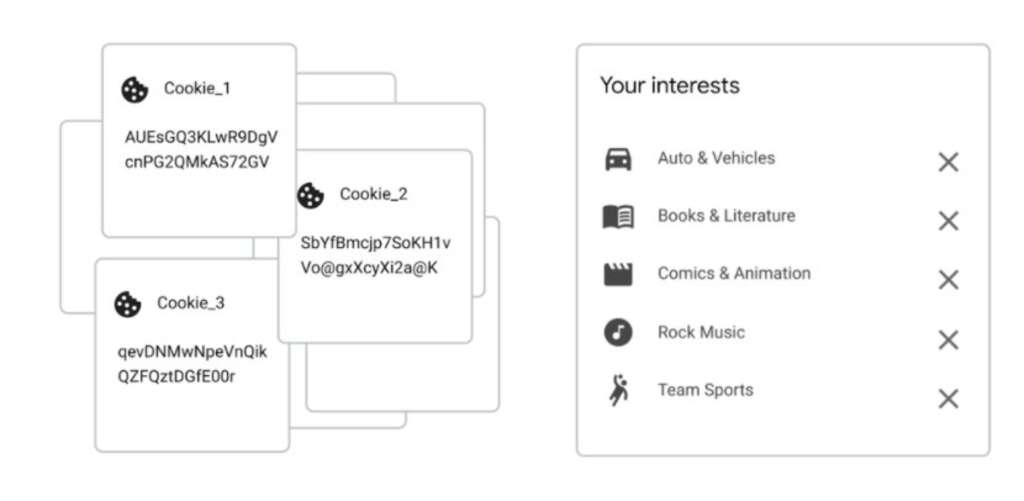With the announcement of the Topics API, Google is steadfast in preparing web users, websites, and advertisers (that includes you, fellow hotel marketer) for a 3rd-party cookie-less world. In this article, we’ll explain the what’s, why’s, and how’s of the Topics API and its effects on hotel marketers and hotel PPC campaigns.
What do hotels need to know about Topics?
Topics API, or Topics for short, is an interest-based targeting proposal aimed at replacing 3rd-party cookies and ridding the challenges introduced by Federated Learning of Cohorts (FLoC). Topics is designed to give web searchers more and easier privacy control. It works by assigning topics, think “Travel” or “Fitness”, to users’ browsers based on their browsing history. Only three topics are shared at a time with sites and advertising partners.

Third-party cookies (left) and Topics (right) illustrated by Google.
Currently, Google says the initial Topics API will include 350 topics. Of those 350 topics, travel-related topics include:
- /Travel & Transportation
- /Travel & Transportation/Adventure Travel
- /Travel & Transportation/Air Travel
- /Travel & Transportation/Business Travel
- /Travel & Transportation/Car Rentals
- /Travel & Transportation/Cruises & Charters
- /Travel & Transportation/Family Travel
- /Travel & Transportation/Honeymoons & Romantic Getaways
- /Travel & Transportation/Hotels & Accommodations
- /Travel & Transportation/Long Distance Bus & Rail
- /Travel & Transportation/Low Cost & Last Minute Travel
- /Travel & Transportation/Luggage & Travel Accessories
- /Travel & Transportation/Tourist Destinations
- /Travel & Transportation/Tourist Destinations/Beaches & Islands
- /Travel & Transportation/Tourist Destinations/Regional Parks & Gardens
- /Travel & Transportation/Tourist Destinations/Theme Parks
- /Travel & Transportation/Tourist Destinations/Zoos, Aquariums & Preserves
- /Travel & Transportation/Travel Guides & Travelogues
Why should hotels care about Topics?
Topics is undoubtedly a victory for privacy and transparency on the web. But it will likely introduce challenges for hotel marketers. If you’re advertising through Google Ads, the new Topics proposal may cause a shift in interest-based audience options available to you.
Notably, an absence of audience groupings based on user interest of specific countries and cities, the absence of traveler profiles, like luxury travelers and snowbound travelers, and an absence of audience groupings of users that have expressed interest in staying at hotels based on star rating will lead to fewer interest-based audience targeting options for hoteliers.
Based on the initial list, it also appears Google will group all accommodation types (e.g. hotels, resorts, motels, bed and breakfasts, extended stay hotels, etc.) together, instead of separating them into their own audience groupings.
Fewer audience options and broader audience groupings will likely introduce less personalized ad experiences and finely tuned campaigns that rely on interest-based targeting will potentially become less so.
How should hotels prepare for Topics?
While Google doesn’t expect the rollout of Topics until Q4 of 2022, hotels should still be diligent in assessing and prioritizing new paid search strategies and identifying gaps in their first-party data collection.
Building first-party data is becoming increasingly important for hotels. The best way to build that data is to be a brand that travelers trust, provide value to your guests, and treat each guest as an individual. That value and trust will build over time, leading to an increase in the quantity and quality of customer first-party data you receive.
It’s also worth keeping an eye out whether Google decides to expand its list of topics. In fact, Google says that feedback will likely lead to the list evolving over time.
Other ways to help you prepare:
Don’t get caught with your hand in the third-party cookie jar without a backup plan. Contact TravelBoom for hotel PPC insight and services.
